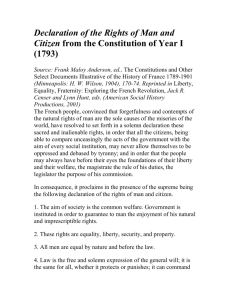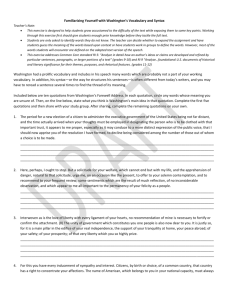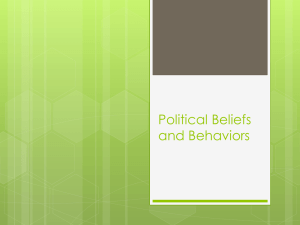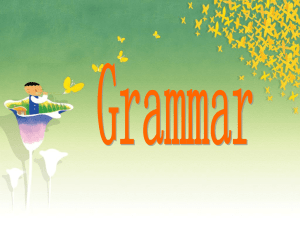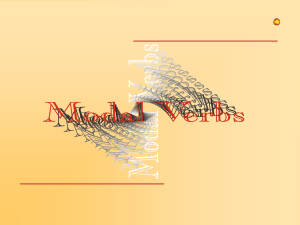Chapter 18-Catherine the Great
advertisement
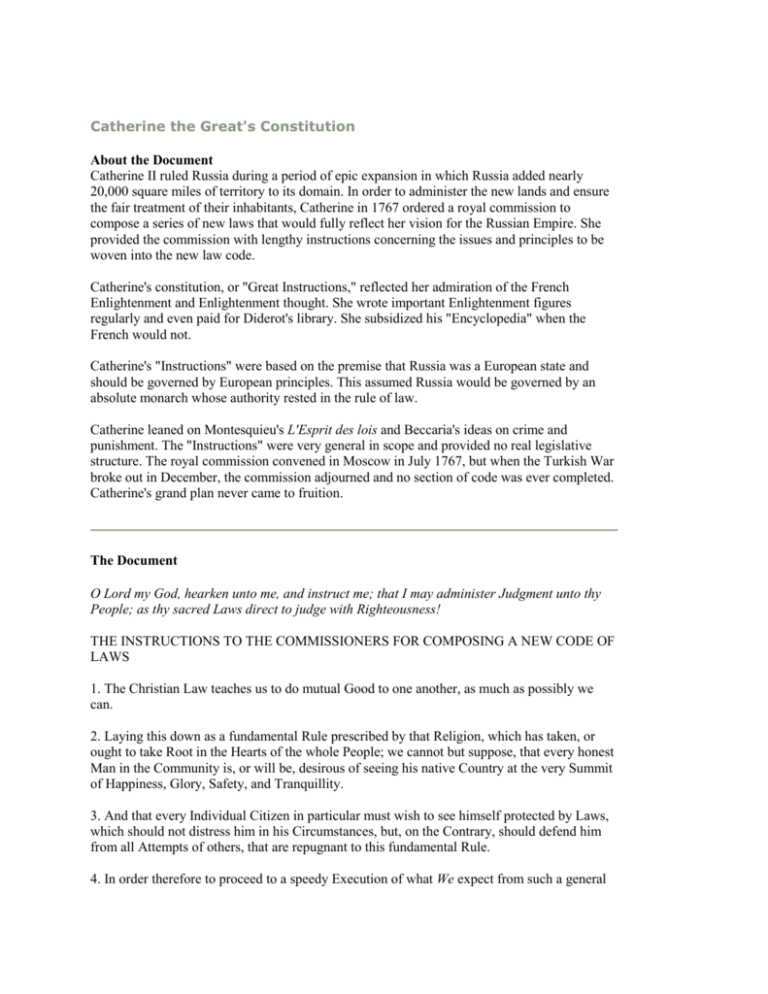
Catherine the Great's Constitution About the Document Catherine II ruled Russia during a period of epic expansion in which Russia added nearly 20,000 square miles of territory to its domain. In order to administer the new lands and ensure the fair treatment of their inhabitants, Catherine in 1767 ordered a royal commission to compose a series of new laws that would fully reflect her vision for the Russian Empire. She provided the commission with lengthy instructions concerning the issues and principles to be woven into the new law code. Catherine's constitution, or "Great Instructions," reflected her admiration of the French Enlightenment and Enlightenment thought. She wrote important Enlightenment figures regularly and even paid for Diderot's library. She subsidized his "Encyclopedia" when the French would not. Catherine's "Instructions" were based on the premise that Russia was a European state and should be governed by European principles. This assumed Russia would be governed by an absolute monarch whose authority rested in the rule of law. Catherine leaned on Montesquieu's L'Esprit des lois and Beccaria's ideas on crime and punishment. The "Instructions" were very general in scope and provided no real legislative structure. The royal commission convened in Moscow in July 1767, but when the Turkish War broke out in December, the commission adjourned and no section of code was ever completed. Catherine's grand plan never came to fruition. The Document O Lord my God, hearken unto me, and instruct me; that I may administer Judgment unto thy People; as thy sacred Laws direct to judge with Righteousness! THE INSTRUCTIONS TO THE COMMISSIONERS FOR COMPOSING A NEW CODE OF LAWS 1. The Christian Law teaches us to do mutual Good to one another, as much as possibly we can. 2. Laying this down as a fundamental Rule prescribed by that Religion, which has taken, or ought to take Root in the Hearts of the whole People; we cannot but suppose, that every honest Man in the Community is, or will be, desirous of seeing his native Country at the very Summit of Happiness, Glory, Safety, and Tranquillity. 3. And that every Individual Citizen in particular must wish to see himself protected by Laws, which should not distress him in his Circumstances, but, on the Contrary, should defend him from all Attempts of others, that are repugnant to this fundamental Rule. 4. In order therefore to proceed to a speedy Execution of what We expect from such a general Wish, We, fixing the Foundation upon the above first-mentioned Rule, ought to begin with an Inquiry into the natural Situation of this Empire. 5. For those Laws have the greatest Conformity with Nature, whose particular Regulations are best adapted to the Situation and Circumstances of the People, for whom they are instituted. This natural Situation is described in the three following Chapters. CHAPTER I 6. Russia is an European State. 7. This is clearly demonstrated by the following Observations: The Alterations which Peter the Great undertook in Russia succeeded with the greater Ease, because the Manners, which prevailed at that Time, and had been introduced amongst us by a Mixture of different Nations, and the Conquest of foreign Territories, were quite unsuitable to the Climate. Peter the First, by introducing the Manners and Customs of Europe among the European People in his Dominions, found at that Time such Means as even he himself was not sanguine enough to expect. CHAPTER II 8. The Possessions of the Russian Empire extend upon the terrestrial Globe to 32 Degrees of Latitude, and to 165 of Longitude. 9. The Sovereign is absolute; for there is no other Authority but that which centers in his single Person, that can act with a Vigour proportionate to the Extent of such a vast Dominion. 10. The Extent of the Dominion requires an absolute Power to be vested in that Person who rules over it. It is expedient so to be, that the quick Dispatch of Affairs, sent from distant Parts, might make ample Amends for the Delay occasioned by the great Distance of the Places. 11. Every other Form of Government whatsoever would not only have been prejudicial to Russia, but would even have proved its entire Ruin. 12. Another Reason is; That it is better to be subject to the Laws under one Master, than to be subservient to many. 13. What is the true End of Monarchy? Not to deprive People of their natural Liberty; but to correct their Actions, in order to attain the Supreme Good. 14. The Form of Government, therefore, which best attains this End, and at the same Time sets less Bounds than others to natural Liberty, is that which coincides with the Views and Purposes of rational Creatures, and answers the End, upon which we ought to fix a steadfast Eye in the Regulations of civil Polity. 15. The Intention and the End of Monarchy, is the Glory of the Citizens, of the State, and of the Sovereign. 16. But, from this Glory, a Sense of Liberty arises in a People governed by a Monarch; which may produce in these States as much Energy in transacting the most important Affairs, and may contribute as much to the Happiness of the Subjects, as even Liberty itself. CHAPTER III 17. Of the Safety of the Institutions of Monarchy. 18. The intermediate Powers, subordinate to, and depending upon the supreme Power, form the essential Part of monarchical Government. 19. I have said, that the intermediate Powers, subordinate and depending, proceed from the supreme Power; as in the very Nature of the Thing the Sovereign is the Source of all imperial and civil Power. 20. The Laws, which form the Foundation of the State, send out certain Courts of Judicature, through which, as through smaller Streams, the Power of the Government is poured out, and diffused. 21. The Laws allow these Courts of Judicature to remonstrate, that such or such an Injunction is unconstitutional, and prejudicial, obscure, and impossible to be carried into Execution; and direct, beforehand, to which Injunction one ought to pay Obedience, and in what Manner one ought to conform to it. These Laws undoubtedly constitute the firm and immoveable Basis of every State. CHAPTER IV 22. There must be a political Body, to whom the Care and strict Execution of these Laws ought to be confided. 23. This Care, and strict Execution of the Laws, can be no where so properly fixed as in certain Courts of Judicature, which announce to the People the newly-made Laws, and revive those, which are forgotten, or obsolete. 24. And it is the Duty of these Courts of Judicature to examine carefully those Laws which they receive from the Sovereign, and to remonstrate, if they find any Thing in them repugnant to the fundamental Constitution of the State, &c. which has been already remarked above in the third Chapter, and twenty-first Article. 25. But if they find nothing in them of that Nature, they enter them in the Code of Laws already established in the State, and publish them to the whole Body of the People. 26. In Russia the Senate is the political Body, to which the Care and due Execution of the Laws is confided. 27. All other Courts of Judicature may, and ought to remonstrate with the same Propriety, to the Senate, and even to the Sovereign himself, as was already mentioned above. 28. Should any One inquire, wherein the Care and due Execution of the Laws consists? I answer, That the Care, and due Execution of the Laws, produces particular Instructions; in consequence of which, the before-mentioned Courts of Judicature, instituted to the End that, by their Care, the Will of the Sovereign might be obeyed in a Manner comformable to the fundamental Laws and Constitution of the State, are obliged to act, in the Discharge of their Duty, according to the Rules prescribed. 29. These Instructions will prevent the People from transgressing the Injunctions of the Sovereign with impunity; but, at the same Time, will protect them from the Insults, and ungovernable Passions of others. 30. For, on the one Hand, they justify the Penalties prepared for those who transgress the Laws; and, on the other, they confirm the Justice of that Refusal to enter Laws repugnant to the good Order of the State, amongst those which are already approved of, or to act by those Laws in the Administration of Justice, and the general Business of the whole Body of the People. CHAPTER V 31. Of the Situation of the People in general. 32. It is the greatest Happiness for a Man to be so circumstanced, that, if his Passions should prompt him to be mischievous, he should still think it more for his Interest not to give Way to them. 33. The Laws ought to be so framed, as to secure the Safety of every Citizen as much as possible. 34. The Equality of the Citizens consists in this; that they should all be subject to the same Laws. 35. This Equality requires Institutions so well adapted, as to prevent the Rich from oppressing those who are not so wealthy as themselves, and converting all the Charges and Employments intrusted to them as Magistrates only, to their own private Emolument. 36. General or political Liberty does not consist in that licentious Notion, That a Man may do whatever he pleases. 37. In a State or Assemblage of People that live together in a Community, where there are Laws, Liberty can only consist in doing that which every One ought to do, and not to be constrained to do that which One ought not to do. 38. A Man ought to form in his own Mind an exact and clear Idea of what Liberty is. Liberty is the Right of doing whatsoever the Laws allow: And if any one Citizen could do what the Laws forbid, there would be no more Liberty; because others would have an equal Power of doing the same. 39. The political Liberty of a Citizen is the Peace of Mind arising from the Consciousness, that every Individual enjoys his peculiar Safety; and in order that the People might attain this Liberty, the Laws ought to be so framed, that no one Citizen should stand in Fear of another; but that all of them should stand in Fear of the same Laws. CHAPTER VI 40. Of Laws in general. 41. Nothing ought to be forbidden by the Laws, but what may be prejudicial, either to every Individual in particular, or to the whole Community in general. 42. All Actions, which comprehend nothing of this Nature, are in nowise cognizable by the Laws; which are made only with the View of procuring the greatest possible Advantage and Tranquillity to the People, who live under their Protection. 43. To preserve Laws from being violated, they ought to be so good, and so well furnished with all Expedients, tending to procure the greatest possible Good to the People; that every Individual might be fully convinced, that it was his Interest, as well as Duty, to preserve those Laws inviolable. 44. And this is the most exalted Pitch of Perfection which we ought to labour to attain to. * * * 57. The Legislation ought to adapt its Laws to the general Sense of a Nation. We do nothing so well as what we do freely and uncontrouled, and following the natural Bent of our own Inclinations. 58. In order to introduce better Laws, it is essentially necessary to prepare the Minds of the People for their Reception. But that it may never be pleaded in Excuse, that it is impossible to carry even the most useful Affairs into Execution, because the Minds of the People are not yet prepared for it; you must, in that Case, take the Trouble upon yourselves to prepare them; and, by these Means, you will already have done a great Part of the Work. 59. Laws are the peculiar and distinct Institutions of the Legislator; but Manners and Customs are the Institutions of the whole Body of the People. 60. Consequently, if there should be a Necessity of making great Alterations amongst the People for their greater Benefit, that must be corrected by Laws, which has been instituted by Laws, and that must be amended by Custom, which has been introduced by Custom; and it is extreme bad Policy to alter that by Law, which ought to be altered by Custom. 61. There are Means of preventing the Growth of Crimes, and these are the Punishments inflicted by the Laws. At the same Time there are Means for introducing an Alteration in Customs, and these are Examples. 62. Besides, the more a People have an Intercourse with one another, the more easy it is for them to introduce a Change in their Customs. 63. In a Word, every Punishment, which is not inflicted through Necessity, is tyrannical. The Law has not its Source merely from Power. Things indifferent in their Nature, do not come under the Cognizance of the Laws. CHAPTER VII 64. Of the Laws in particular. 65. Laws carried to the Extremity of Right, are productive of the Extremity of Evil. * * * 123. The Usage of Torture is contrary to all the Dictates of Nature and Reason; even Mankind itself cries out against it, and demands loudly the total Abolition of it. * * * 180. That Law, therefore, is highly beneficial to the Community where it is established, which ordains that every Man shall be judged by his Peers and Equals. For when the Fate of a Citizen is in Question, all Prejudices arising from the Difference of Rank or Fortune should be stifled; because they ought to have no Influence between the Judges and the Parties accused. * * * 194. No Man ought to be looked upon as guilty, before he has received his judicial Sentence; nor can the Laws deprive him of their Protection, before it is proved that he has forfeited all Right to it. What Right therefore can Power give to any to inflict Punishment upon a Citizen at a Time, when it is yet dubious, whether he is Innocent or guilty? * * * 269. It seems too, that the Method of exacting their Revenues, newly invented by the Lords, diminishes both the Inhabitants, and the Spirit of Agriculture in Russia. Almost all the villages are heavily taxed. The Lords, who seldom or never reside in their Villages, lay an Impost on every Head of one, two, and even five Rubles, without the least Regard to the Means by which their Peasants may be able to raise this Money. 270. It is highly necessary that the Law should prescribe a Rule to the Lords, for a more judicious Method of raising their Revenues; and oblige them to levy such a Tax, as tends least to separate the Peasant from his House and Family; this would be the Means by which Agriculture would become more extensive, and Population be more increased in the Empire. Source: The Grand Instructions to the Commissioners Appointed to Frame a New Code of Laws for the Russian Empire: Composed by Her Imperial Majesty Catherine II, Empress of all the Russias, trans. Michael Tatischeff (London, 1768). Analysis Questions 1. Compare the approaches in "reporting" events. 2. In the end, no one comes to Poland's aid, but Europe will come to Bulgaria's aid. Might the style of these pieces hint at the reason for that? If so, how? If not, why not? 3. In these two documents, what evidence do you see of a religious explanation of the events? 4. What do the writers see as the final outcome for Poland and Bulgaria? 5. Why do you think that the reporters of these events chose their particular style of writing?
